— Filed by Justin Murphy for Rochester Democrat and Chronicle
Rochester, NY, September 14, 2021 - The idea was to get as far away from Zoom as possible, so a few dozen local educators were sitting on downed logs or cross-legged on the ground at Durand Eastman Park one pleasant afternoon earlier this month, learning the finer points of teaching in nature.
"You won't look like you're teaching," warned Andy Webster of the Walden Project. Conducted at Cummings Nature Center in Naples, the Walden Project is a year-long outdoor school sojourn for teenagers inspired by Henry David Thoreau's time at Walden Pond.
An intensive outdoors experience, Webster explained, could have the effect of stirring deep-seated emotions for children, or turning classroom wallflowers into leaders.
"Everyone has their own experience with nature, and a lot of the time it's going to come up," he said. "You just have to sit with them."
Webster and other environmental educators in the Rochester area say this sort of lesson is part of a growing trend. Concern over climate change, Zoom fatigue and a backlash to test-driven pedagogy have resulted in strong interest in education that connects to the local environment.
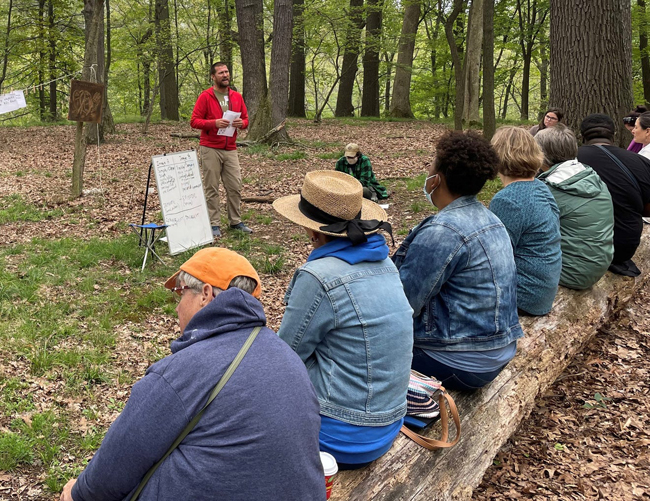
Andy Webster, lead teacher at the Walden Project, speaks at the Nature-Based Learning Symposium at Durand Eastman Park Sept. 1, 2021. Credit: Justin Murphy/Rochester Democrat and Chronicle
"Given the pandemic, I think a lot of people were yearning for this," said Kyra Stephenson, a science teacher at Greece Olympia who is involved in the effort to promote environmental education. "Then, when that sense of awe hits, you've got them. And that's hard to do in a classroom setting."
The nature-based learning symposium at Durand Eastman was organized by Rochester Ecology Partners, a group founded by former Rochester City School District science teacher Chris Widmaier. It drew classroom teachers from around the region as well as people who teach in recreational programs and other settings.
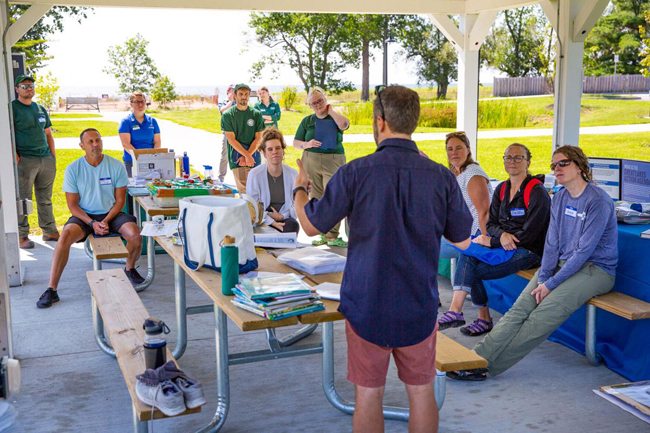
Nate Drag, New York Sea Grant Great Lakes Literacy Specialist, runs through resources at a New York Sea Grant (NYSG)—NYS Department of Environmental Conservation (NYSDEC) Great Lakes education workshop at Southwick Beach State Park in Henderson on July 21st. Credit: Kara Dry/Watertown Daily Times
In August, a different group of educators were at Hamlin Beach State Park to learn how to incorporate the Great Lakes into their classrooms. That training was run by the state Department of Environmental Conservation and New York Sea Grant.
One popular component was a 10-lesson unit on sturgeon, the massive lake fish that spawns in the Genesee River. It includes information on the ecological significance of the fish, its place in Iroquois culture and current efforts to preserve and restore its habitat.
Teachers were given a six-foot long vinyl sturgeon cut-out to put on their classroom walls, among other things.
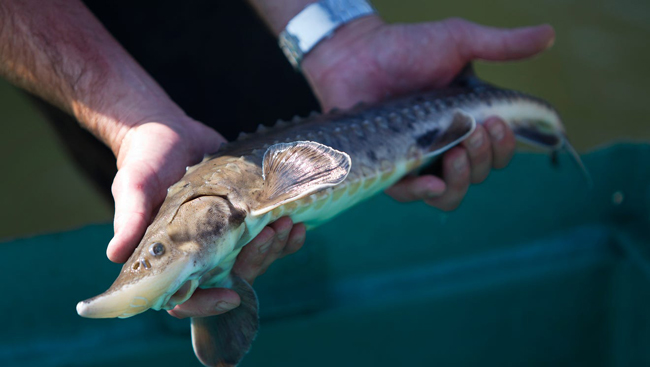
Dan Mulhall with the DEC holds a larger sturgeon as he prepares to release 1,000 others into the Genesee River. Credit: Lauren Petracca/Staff Photographer
"It's a great visual reminder for why we do everything we do for the environment," said Peter Hentschke, a science teacher at the Harley School.
The lessons are not confined to science class. The Great Lakes curriculum includes lessons about the Underground Railroad, portraying Harriet Tubman as a naturalist who used intimate knowledge of the environment to lead people to freedom.
"Placing it in the context of science and environmental understanding – looking at stars, native plants, waterways – and thinking of the way people moved on the Underground Railroad makes it really interesting," said Nate Drag, a literacy specialist at New York Sea Grant. "What we’re seeing is the interdisciplinary nature of these projects."
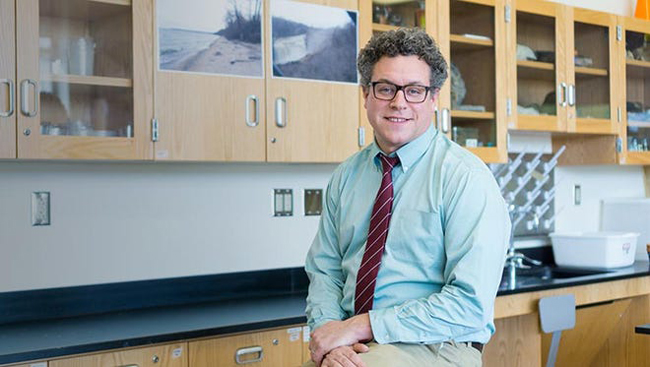
Rochester Ecology Partners founder Chris Widmaier. Credit: Dan Chung
Another initiative is at St. John Fisher College's Center for Sustainability, which runs a grant-funded teacher professional development program based on Finger Lakes watersheds. And many of the local leaders communicate through a group called the Aquatic Education Network at Genesee RiverWatch.
"I don't think we can expect the next generation to protect this planet if they don't feel connected to it," Stephenson said. "As educators, it's our job to create those interactions with nature. ... Educators need to get comfortable with nature and with how to use it in all content areas."
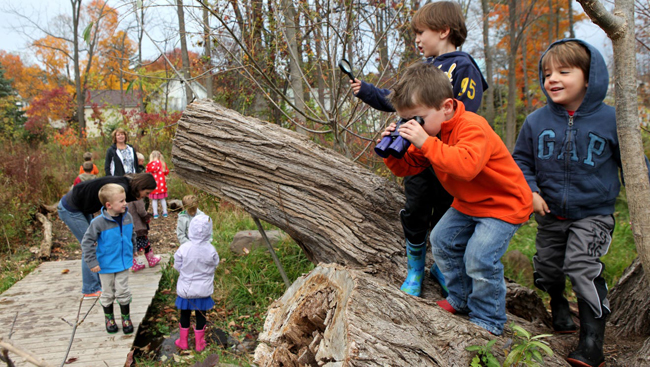
Max Mayo (standing), Quinn Brooks (with binoculars) and Oren Davis climb a tree for a better vantage point of the outdoor classroom at Lima Primary School. Credit: Max Schulte/Staff Photographer
More Info: New York Sea Grant
New York Sea Grant (NYSG), a cooperative program of Cornell University
and the State University of New York (SUNY), is one of 34 university-based
programs under the National Oceanic and Atmospheric Administration’s
National Sea Grant College Program.
Since 1971, NYSG has represented a statewide network of integrated
research, education and extension services promoting coastal community
economic vitality, environmental sustainability and citizen awareness
and understanding about the State’s marine and Great Lakes resources.
Through NYSG’s efforts, the combined talents of university scientists
and extension specialists help develop and transfer science-based
information to many coastal user groups—businesses and industries,
federal, state and local government decision-makers and agency managers,
educators, the media and the interested public.
The program maintains Great Lakes offices at Cornell University, SUNY
Buffalo, SUNY Oswego and the Wayne County Cooperative Extension office
in Newark. In the State's marine waters, NYSG has offices at Stony Brook
University in Long Island, Brooklyn College and Cornell Cooperative
Extension in NYC and Kingston in the Hudson Valley.
For updates on Sea Grant activities: www.nyseagrant.org has RSS, Facebook, Twitter, Instagram, and YouTube links. NYSG offers a free e-list sign up via www.nyseagrant.org/nycoastlines for its flagship publication, NY Coastlines/Currents, which is published quarterly.